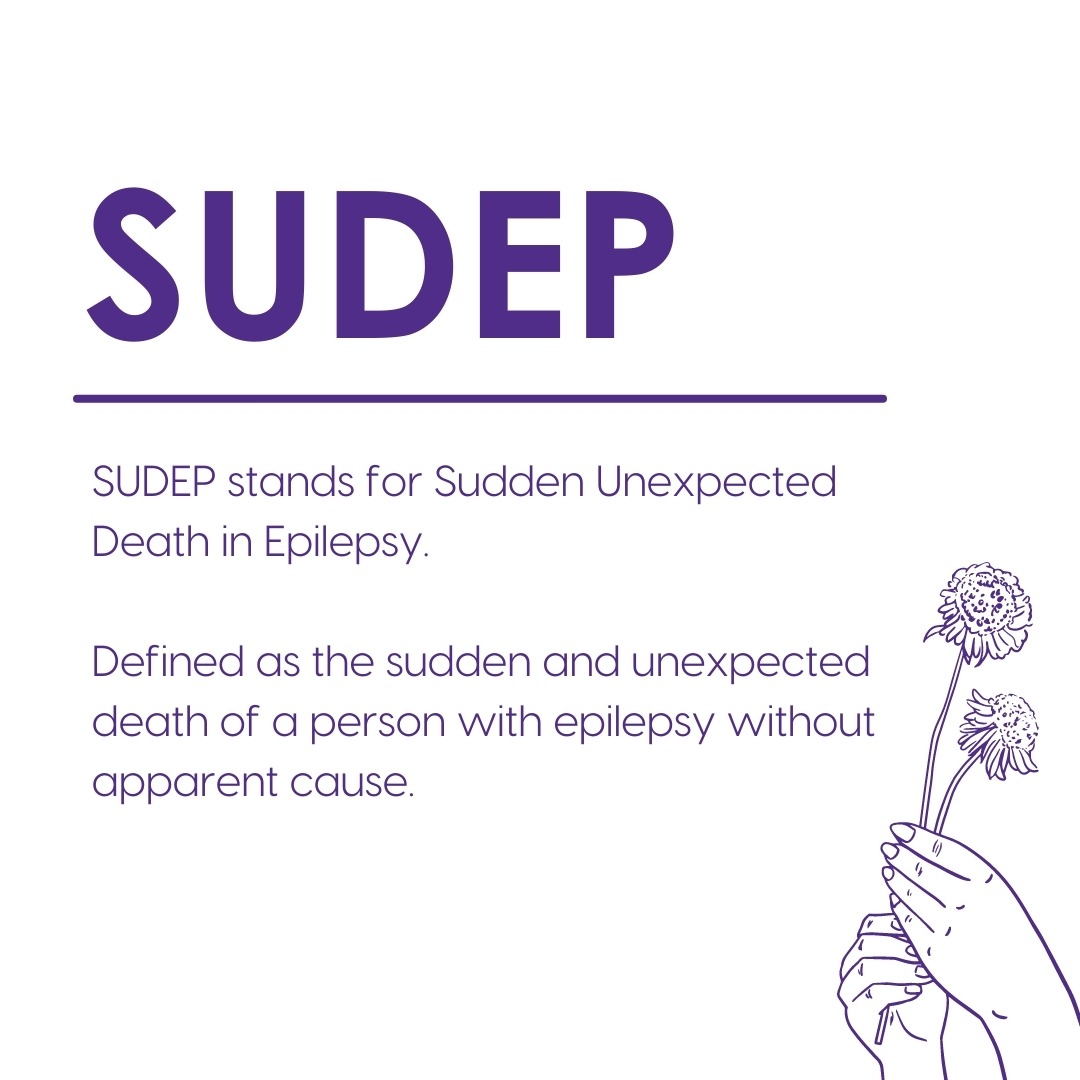What is SUDEP?
SUDEP stands for “Sudden Unexpected Death in Epilepsy”. It is a category of uncommon sudden death, used when a person with epilepsy dies unexpectedly, without apparent cause. In a typical case of SUDEP, an otherwise healthy person with active epilepsy dies suddenly, unobserved. It is not a condition or disease, but rather the category to which these types of unexplained deaths are assigned.

SUDEP FREQUENTLY ASKED QUESTIONS
What causes SUDEP?
Research indicates that there is likely more than one explanation for SUDEP. According to one theory, electrical discharges in the brain may change the electrical status of the heart, affecting its rhythm. Another theory is that breathing is stopped by a seizure. In either case, a post-mortem examination reveals no anatomical cause of death.
What are the chances of dying from SUDEP?
The risk remains uncertain, and more research is badly needed. It has been estimated that fewer than One in 1,000 people with epilepsy will die of SUDEP each year.
However, the true number of deaths due to SUDEP is unknown and is likely higher than these estimates. This is primarily because:
- The identification of SUDEP is poor due to lack of awareness;
- Anatomic findings (e.g. tongue/lip bite) implicating epilepsy as a cause or contributor to the death are commonly lacking;
- Autopsies may not be conducted, which are vital for making the diagnosis by exclusion required for accurate determination of SUDEP, and;
- There are challenges to, and inconsistencies in, the investigation and certification/recording of these deaths.
Could SUDEP happen to me?
When people with epilepsy are told about SUDEP, they ask, “Will it happen to me?” The chances of dying from it are remote. Some people may be more at risk than others, especially young people aged 20-40 with tonic-clonic (grand mal) seizures which are not fully controlled by medication. Not taking medication correctly or regularly, being alone during seizures and using alcohol or street drugs may also be factors.
What can I do to lower the risk of SUDEP?
No one knows for sure, but seeking treatment regularly to get the best possible seizure control, avoiding sudden drug withdrawal, and taking one’s medication regularly are recommended. Avoiding alcohol, maintaining regular and adequate sleep patterns, exercising, eating nutritious meals and learning to manage stress are simple things that may make a difference. Concerned relatives should know that staying with someone for 15 to 20 minutes after a seizure to ensure they are breathing easily would be useful. Family members may want to learn CPR.
Should people with epilepsy live differently because of SUDEP?
It is important for people with uncontrolled epilepsy to balance the awareness of their slightly increased risk of death with the need to live as normal a life as possible. There are usually very few things that people with epilepsy cannot do.
Do doctors have a role to play with regard to SUDEP?
The risk of SUDEP, while relatively small, is nevertheless real. We believe it should be discussed openly by doctors with patients and their families. Direct and reasoned discussion may improve compliance with medication and lifestyle regimens. It may also prevent the family feeling betrayed by the doctor should a sudden death ever occur. “Why weren’t we told?” is a common reaction of family members bereaved by SUDEP.
In some cases of SUDEP, individuals are found to have sub-therapeutic blood levels of anti-epileptic drugs. It is prudent to try to predict those who might be most susceptible to SUDEP, particularly young people aged 20 to 40 with poorly controlled tonic-clonic seizures. It may be beneficial for these patients to be monitored by their physician with increased frequency during this period and compliance assessed more frequently.
If a SUDEP death should occur, we believe it is important that it be formally identified as SUDEP. In addition to information, families bereaved by SUDEP need to be offered a compassionate ear and grief counselling.
ADDITIONAL RESOURCES
Local Support
Based out of Toronto, SUDEP Aware introduces those impacted by SUDEP to others bereaved by SUDEP for peer connection. They share SUDEP research and resources, and spread awareness and advocacy for SUDEP. Find their series of SUDEP educational brochures here.
Bereaved Families of Ontario (BFO) is a province-wide organization dedicated to bereavement support through self-help and mutual aid at no cost to those in need.
Global Community Support
Epilepsy Foundation (United States)
A source for additional resources, webinars, education, and support for those impacted by SUDEP.
The SUDEP Institute (via Epilepsy Foundation)
The SUDEP Institute drives and supports research into the causes of SUDEP and ways to prevent it.
An organization that focuses their efforts on preventing SUDEP, supporting those impacted, and sponsoring SUDEP research and education.
Partners Against Mortality in Epilepsy (PAME)
PAME is a collaboration with the goal of improving understanding of and working to prevent epilepsy-related forms of mortality, including suicide, accidents, status epilepticus and with a strong focus on SUDEP.
ORGAN / TISSUE DONATION FOR SUDEP
Organ and tissue donation for transplantation or towards disease research can help save, or change, someone’s life. Learn more about the urgent need for organ and tissue donations for transplantation and for vital research towards the prevention of epilepsy-related death.
See the Person: Remembering Nebyu
When Anna Argaw’s son, Nebyu Taddese, was diagnosed with epilepsy it came as a shock. He was in Grade 10 and his seizures appeared suddenly. Even more shocking was his unexpected death from SUDEP only a few years later at the age of 19. Read Anna and Nebyu’s story here.


